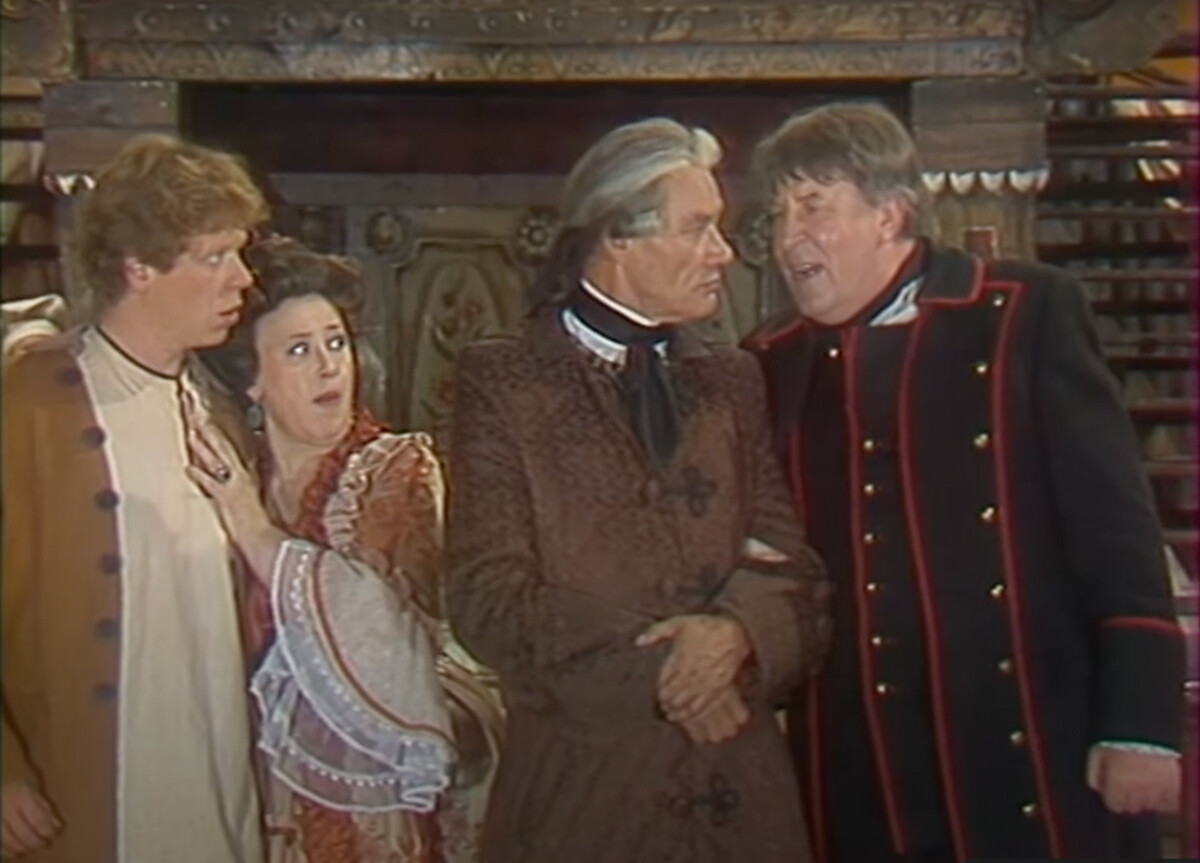
'The Minor' TV screening
Vitaly Ivanov, Vladimir Semakov, 1987/ATO "Ekran"In the 18th century, young nobles who didn’t receive any education (even homeschooling) were referred to as “minors”. They were not accepted into state service and it was incredibly hard for them to get married. In Fonvizin’s play, such a youngster named Mitrofan lives in the family of the Prostakovs (the surname translates in English as ‘The Simples’). He is stupid, spoiled and ungrateful. His father is a weak man, who tries to please his authoritative and wicked wife in everything. She loves her son very much and wards him from everything and, at the same time, wishes to beneficially marry him to a girl named Sofia with a good dowry. The latter, however, turns out to be an honest and educated young woman, who is in no hurry to marry. Then, the mother decides to kidnap the bride for her “minor”...
Russian literature of the 18th century was full of far-fetched tragedies written in a very officious style, as well as sentimental dramas. Fonvizin was one of the first who wrote a really funny comedy, almost in colloquial language. With that said, according to the 18th century Classicism style, the play is quite straightforward: it has a moral and clear roles of negative and positive characters.
Catherine the Great saw a satire of the nobility and social structure in it and prohibited it from being published. However, all the subsequent generations of authors admired the comedy. Today, it’s included in the national school program; many Russian children who don’t want to study are jokingly called “minors”.
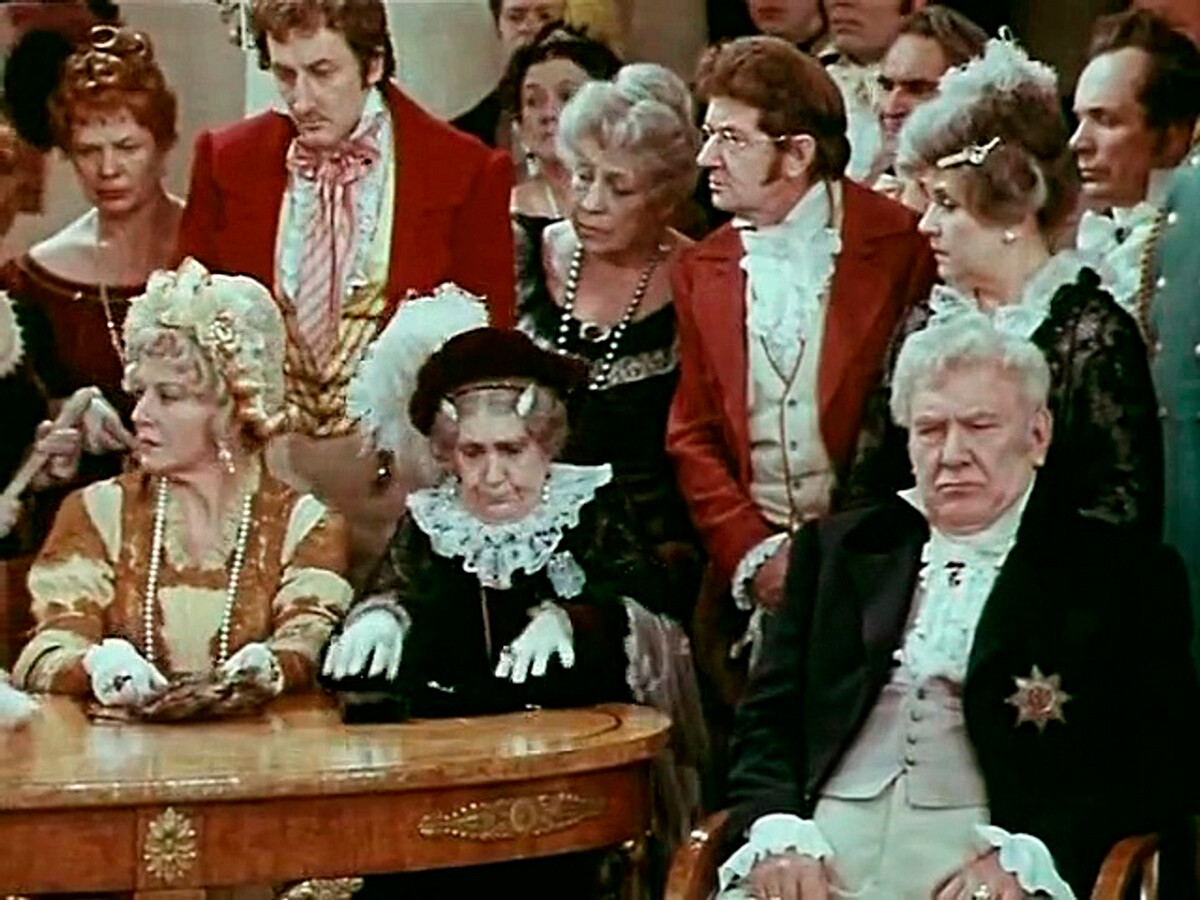
A still from 'Woe from Wit' TV adaptation
Mikhail Tsarev, 1977/TO "Ekran"The plot of the play takes place in Moscow, ten years after the end of the Patriotic War of 1812 against Napoleon’s France. Alexander Chatsky, a young man with progressive views, returns home from abroad. He goes to visit his young beloved Sofia, intending to ask her father to permit him to marry her.
But, it turns out that Sofia is already in love with someone else – a not very pleasant man, who tries to please everyone. Progressive Chatsky gets into an argument with the friends of the girl’s father, the representatives of the most narrow-minded generation. He feels alien and quarrels with everybody…
This comedy in verse became a true revolution in Russian dramaturgy – written in simple language, it brought down the canons of the 18th century Classicism and became the first Realist play. To this day, ‘Woe from Wit’ is performed in many theaters of the country.
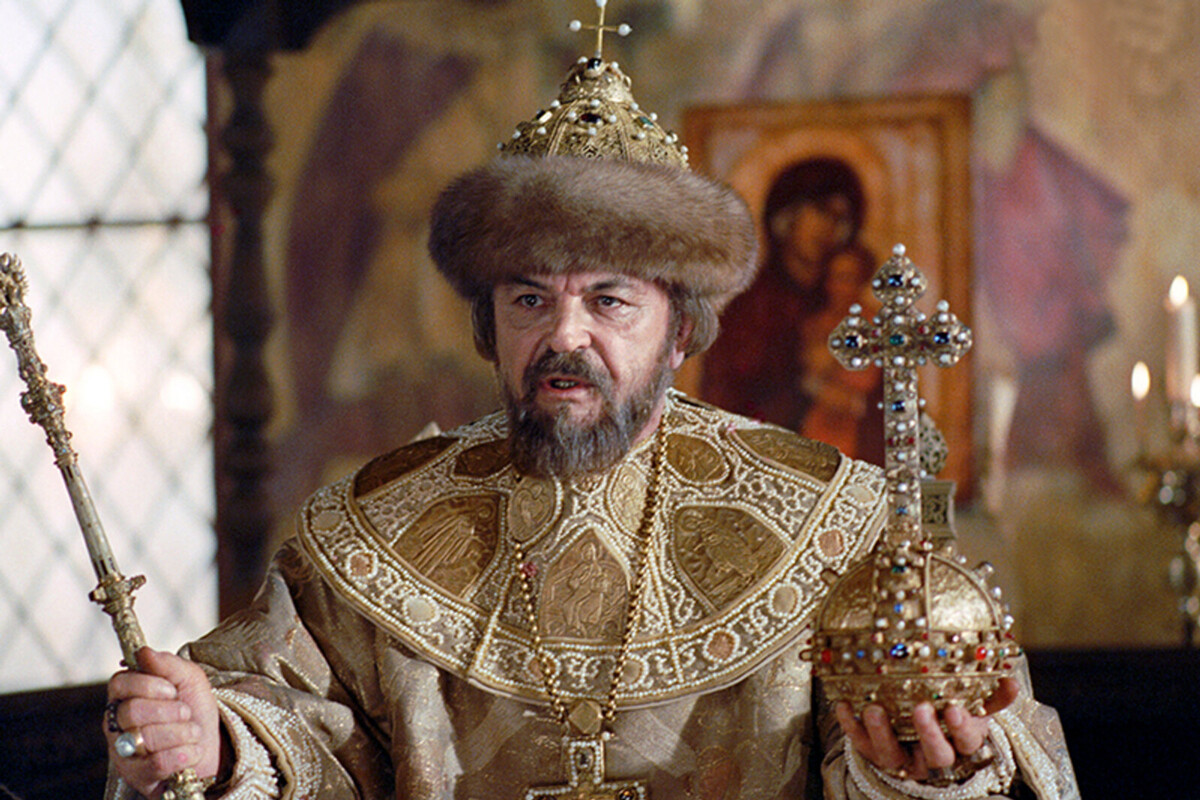
A still from 'Boris Godunov' movie
Sergei Bondarchuk, 1986/MosfilmOne of the most mysterious pages of Russian history – the so-called ‘Time of Troubles’ at the beginning of the 17th century. The Rurikid dynasty was cut short with Ivan the Terrible’s son, Fyodor Ioannovich. Boris Godunov ascended to the throne. Russia was attacked by the Poles who supported the impostor False Dmitry I…
Pushkin fantasizes how exactly False Dmitry I conceived his sinister plan. It’s because of the leading Russian poet that the majority believes Boris Godunov gave the order to assassinate Tsarevich Dmitry – the youngest son of Ivan the Terrible and the only potential heir and successor of the Rurikid dynasty. Although historians do not have a definitive opinion on that.
On the basis of this historical tragedy, Modest Mussorgsky wrote his legendary opera. The play has since been performed in theaters across the world many times over; it was also adapted for the big screen.
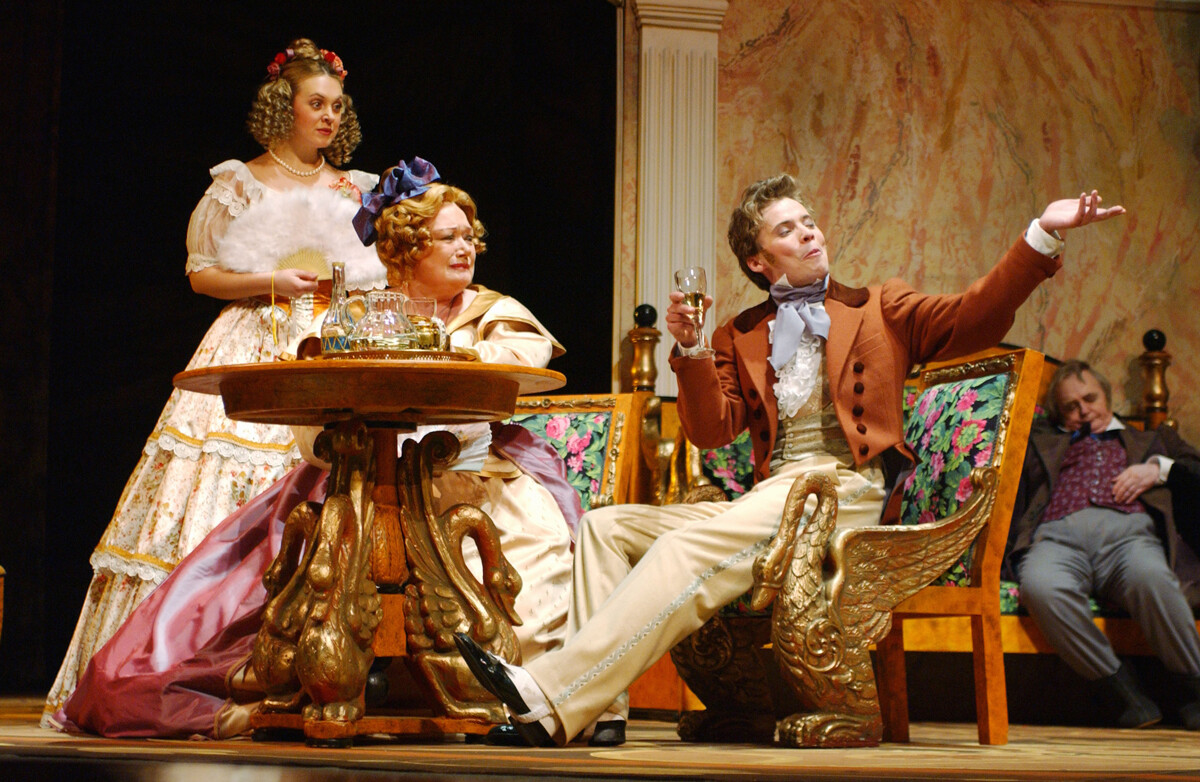
'The Government Inspector' at the Maly Theater in Moscow
TASSIn a tiny town, corrupt-to-the-core government officials are waiting for the arrival of an important official from the capital coming incognito for an inspection. Accidentally, they mistake a minor official, who just happened to end up there after losing everything playing cards, for this important person. However, the adventurer is in no hurry to dissuade the mayor and his subordinates – to the contrary, he decides to use their services, accepts bribes and even hatches a plan to marry the Mayor’s daughter…
‘The Government Inspector’ is, perhaps, the main Russian comedy about corruption, bootlicking and the consumerist attitude of the authorities towards regular people. It’s so relevant (and funny) to this day that it’s still performed in the majority of Russian theaters.
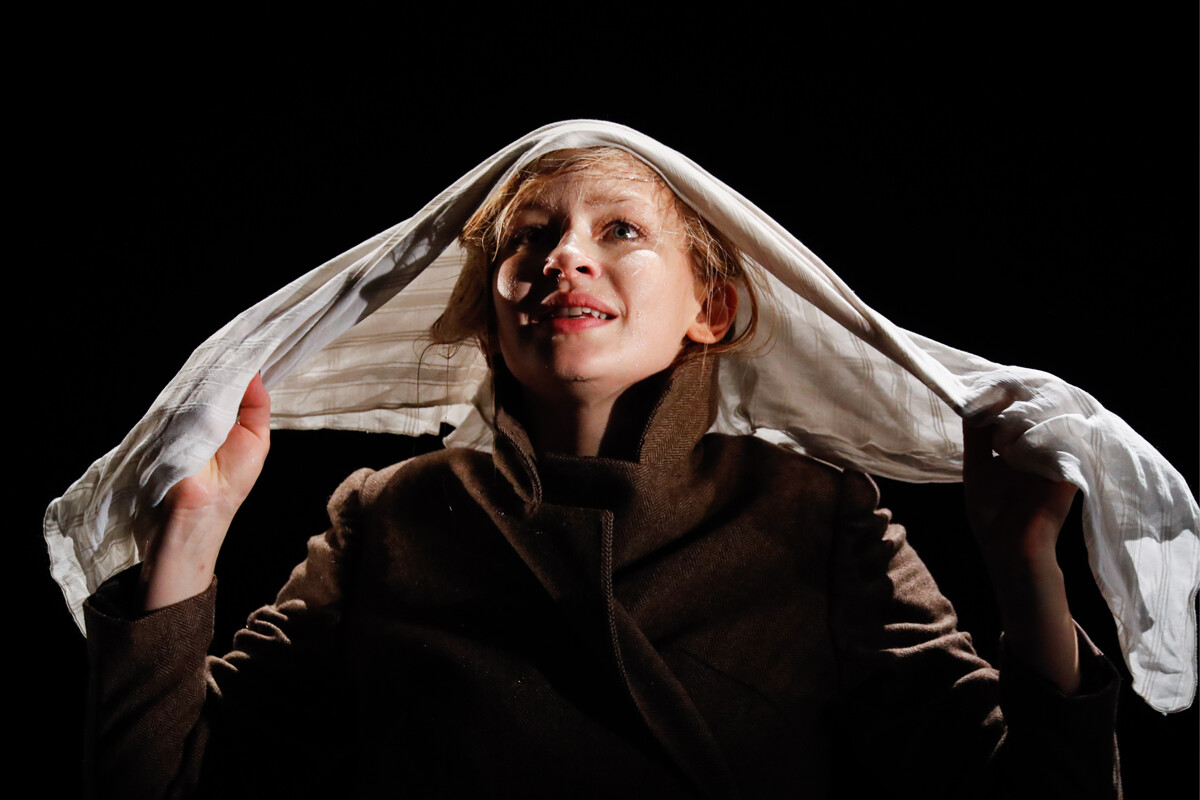
Yulia Peresild as Katerina in 'The Storm' performance by Moscow's Theater of Nations
Artyom Geodakyan/TASSKaterina, the main heroine of the play, lives in a small town on the Volga in a very patriarchal merchant family. Her husband is cold towards her and she has to obey her despotic mother-in-law. In the end, Katerina falls in love with another man and cheats on her husband, but, unable to cope with this moral downfall, she throws herself into the Volga and dies.
‘The Storm’ was one of the first works that raised the problem of the oppressed position of women. The play provoked a strong reaction from the public and critics. Publicist Nikolay Dobrolyubov wrote his famous article ‘A Ray of Light in the Kingdom of Darkness’ about the play, the name of which became an idiom.
He believes Katerina to be a victim of the old rigid merchant world and admires her bravery to go against this world. Even her suicide he views as a heroic and the only possible way out from this “kingdom of darkness”.
The play was performed on the stage of Moscow’s Maly Theater and was a big success; it’s still considered a benchmark of Russian drama and the characters’ names from it have become appelatives.
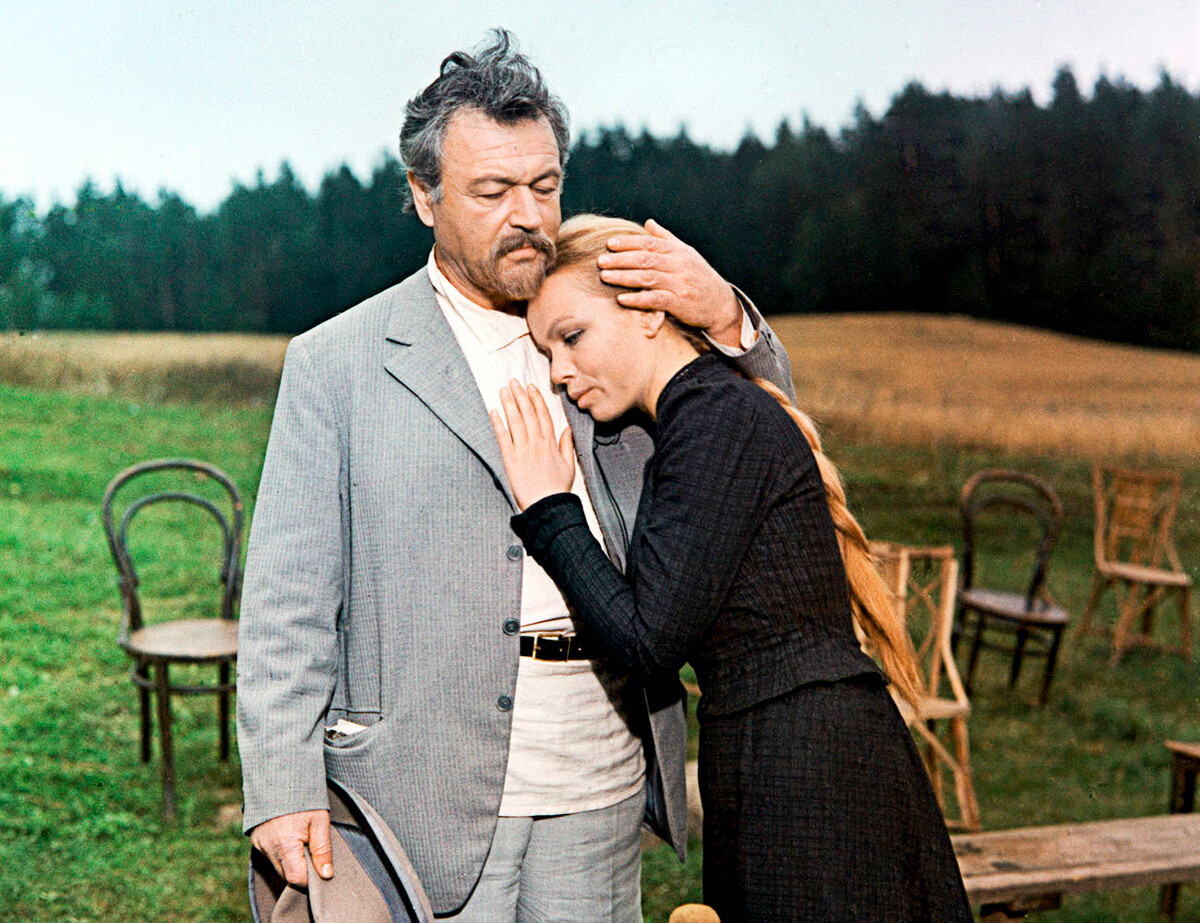
A still from 'The Seagull' movie
Yuliy Karasik, 1970/MosfilmKonstantin Treplev, an amateur playwright, puts on a play he wrote in his uncle’s country estate. He invites Nina, their neighbors’ daughter that he’s in love with, to play the main role. Friends and neighbors gather for the premiere of the amateur play; they praise Nina’s performance, but criticize the play itself for excessive decadence. This makes the author quite upset; on top of that, Nina falls in love with one of her admirers and Treplev even tries to take his own life.
In ‘The Seagull’, Chekhov draws attention to the decline of the Russian nobility. He would go on developing this topic in his other plays. In his opinion, these people couldn’t work anymore, they lived in their own dreams, usually not having any money. They enjoyed art, tried to act, write and create, but they couldn’t admit that in reality they had no talent. They mixed up life and art; they were looking for fame, ignoring human relations.
‘The Seagull’ was put on stage in the Moscow Art Theater by Konstantin Stanislavski and Vladimir Nemirovich-Danchenko in 1898 and was a great success.
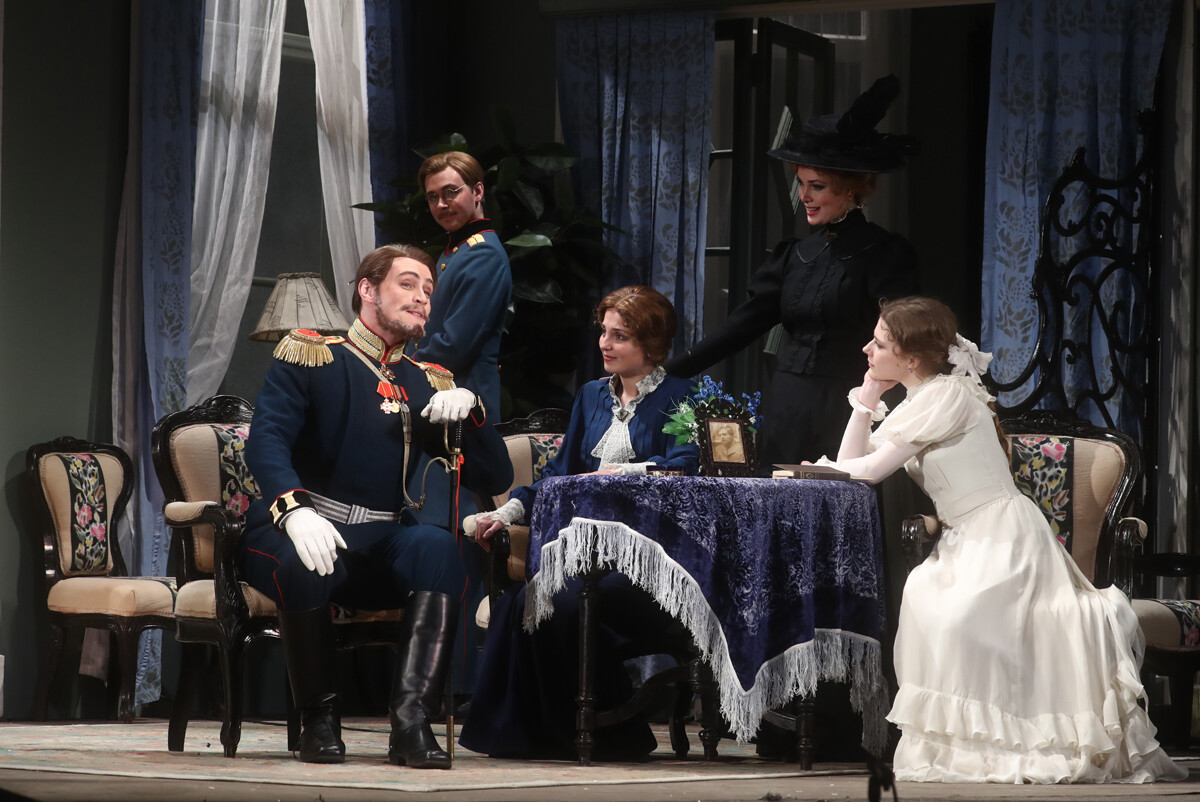
'Three Sisters' at the Gorky Moscow Art Theater, a historical reconstruction of Vladimir Nemirovich-Danchenko's 1940 production
Stanislav Krasilnikov/TASSThree sisters and their brother live in a provincial town. Their father died a year ago and, now, they are thinking of what to do next in their lives. Olga, the eldest, works as a teacher, middle sister Masha is unhappy in marriage, while the youngest sister can neither find a man nor something to do that she would enjoy. These cultured sisters live quite empty and useless lives; they only dream and make plans, never to be materialized. At the same time, they don’t understand their brother, who married a simple woman and left science behind.
The play has almost no plot and Chekhov himself wrote about it: “A lot of talking, not much action.” With all the melancholy and the inaction of the characters, obvious to viewers, ‘Three Sisters’, to this day, is staged in many theaters and always gathers full halls.
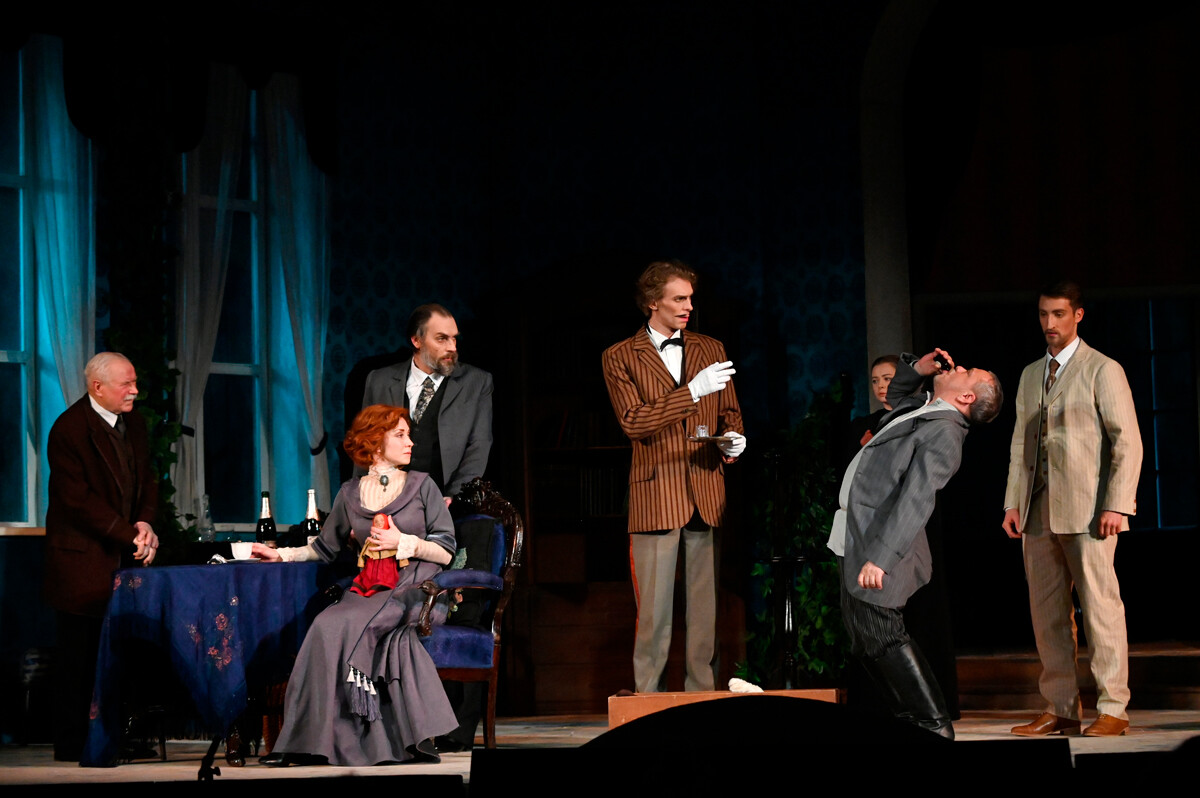
'The Cherry Orchard' at the stage of the Gorky Moscow Art Theater
Vladimir Fedorenko/SputnikNoblewoman Lyubov Ranevskaya has spent all her fortune in France. She only has an estate with a beautiful cherry orchard left. However, the estate is about to be sold at an auction for debts. Yermolai Lopakhin, a grandson of a serf who served in Ranevskaya’s family and now a wealthy merchant, proposes to split the land and rent out small parts of it to earn some money and pay off the debts.
But, Ranevskaya doesn’t want to cut down her priceless orchard and ignores his idea; she prefers to continue her idle life, do nothing and only complain about her circumstances. One day, Lopakhin states that he bought her estate and the cherry orchard at an auction. He’s incredibly happy that he got the land where his grandfather was a slave. The play ends with the sound of axes cutting down cherry trees.
‘The Cherry Orchard’s premiere took place in the Moscow Art Theater; legendary director Konstantin Stanislavski said this about the meaning of the play: “‘The Cherry Orchard’ doesn’t bring any profits, it keeps within itself and its white blossom the poetry of a past aristocratic life. Such an orchard grows and blossoms for a whim, for the eyes of spoiled aesthetes. It’s a pity to destroy it, but it has to be done, since the process of economic development of the country demands it.”
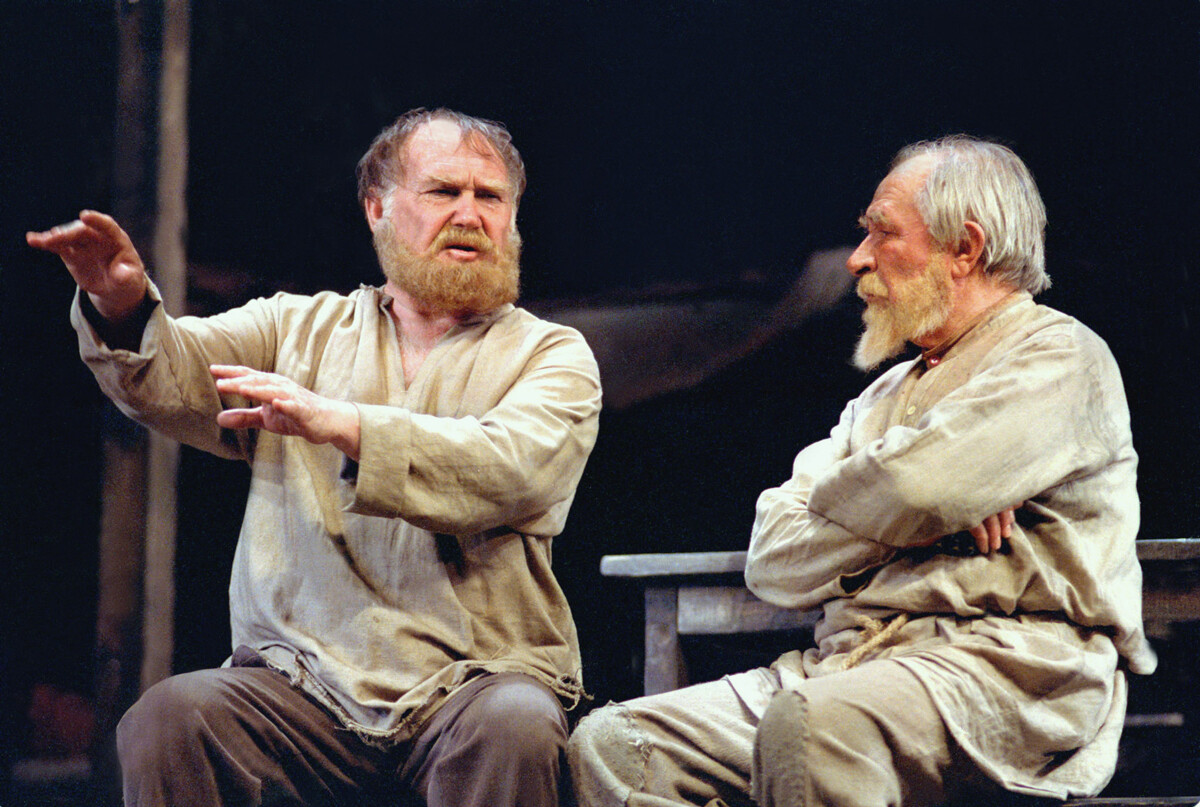
'The Lower Depths' at the Tovstonogov Bolshoi Drama Theater in St. Petersburg
Yury Belinsky/TASSThis is a grim story about the life of the lowest social classes – the plot takes place in a homeless shelter for the poor. Every character develops and it turns out that each of them has a very different and complex fate.
Having read this play, Tolstoy once said to Gorky in surprise: “Why are you writing this?” He couldn’t imagine that the public would be interested in a play about a homeless shelter, where prostitutes and alcoholics are shown with no frills. However, this truthful drama enjoyed great success on the stage of the Moscow Art Theater and was also immediately put on stage in Germany.
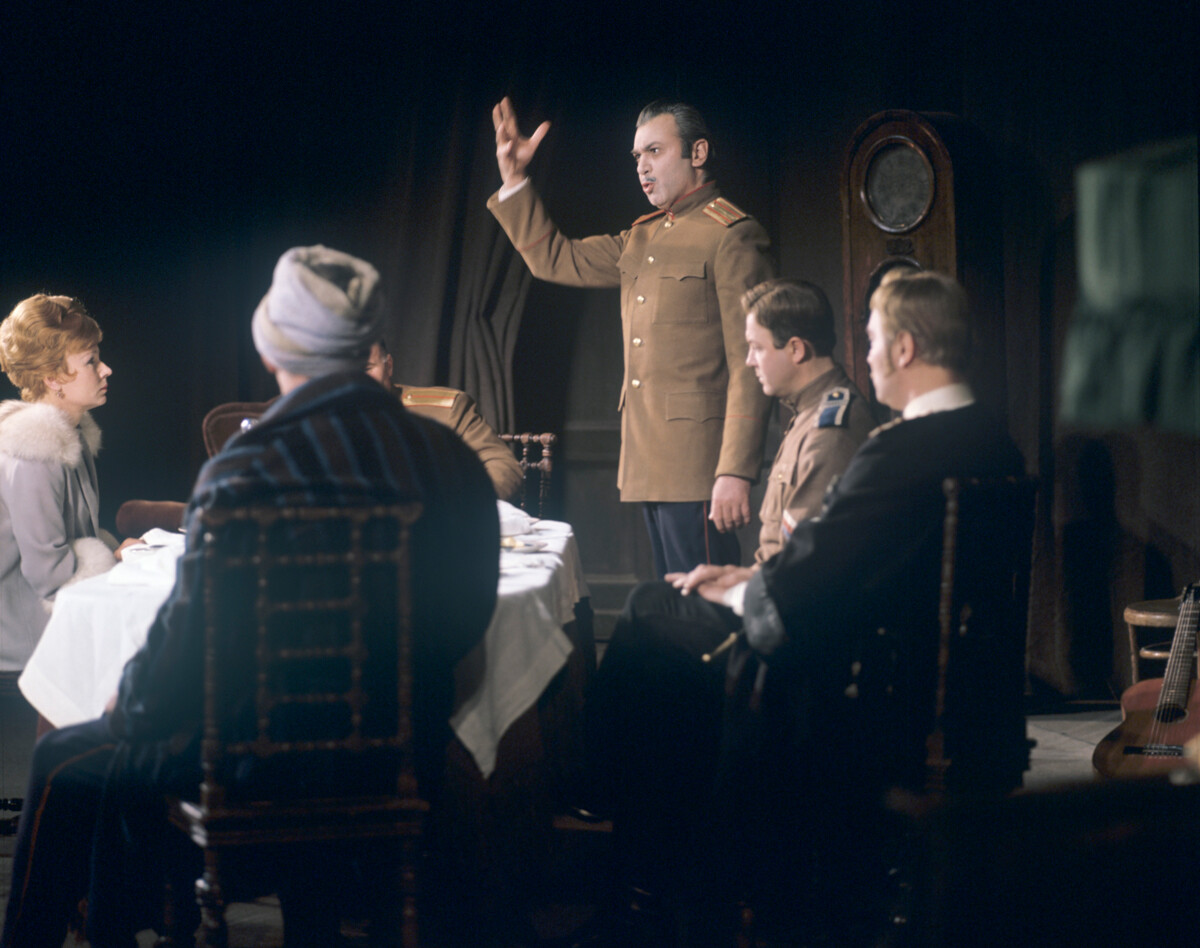
'The Days of the Turbins' at the Moscow Art Theater
SputnikThis play is about Kiev during the Civil War at the end of 1918 – beginning of 1919. The authorities change yet again in the town where the noble cultured Turbin family tries to maintain their usual way of life, while the world is crumbling and chaos reigns around them. They accept officers of the White movement into their house; Turbin himself participates in the Civil War on the side of the Whites.
Bulgakov was commissioned to write this play by the Moscow Art Theater, based on his novel ‘The White Guard’. In many respects, the plot is autobiographical; Bulgakov really did live in Kiev during the Civil War and witnessed its twists and turns, remaining a monarchist until the end of his life. He didn’t accept the revolution but didn’t leave the country. Many of his works, filled with contempt towards the new reality and the Soviet rule, were prohibited from publication.
Dear readers,
Our website and social media accounts are under threat of being restricted or banned, due to the current circumstances. So, to keep up with our latest content, simply do the following:
If using any of Russia Beyond's content, partly or in full, always provide an active hyperlink to the original material.
Subscribe
to our newsletter!
Get the week's best stories straight to your inbox